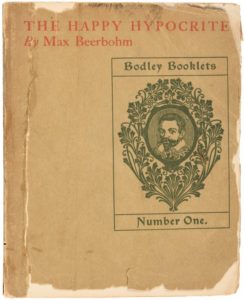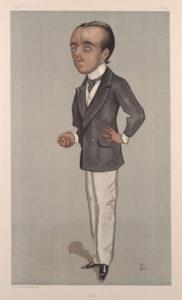 Max Beerbohm’s The Happy Hypocrite: A Fairy Tale for Tired Men, written in 1897, is an Oscar Wilde-like fable whose protagonist, Lord George Hell, is a “greedy, destructive, and disobedient” Regency rake whose face bears the marks of his dissolution. Then he falls in love with a sweet, innocent young girl named Jenny Mere. In order to court her, he dons a mask that makes him look like a saint, and endeavors thereafter to live in a manner worthy of his “new” face. Lord George and Jenny marry and live happily together—until one of his former mistresses shows up and, enraged, tears off the mask. But to Lord George’s astonishment, he discovers that the face beneath it is no longer that of a debauched rake:
Max Beerbohm’s The Happy Hypocrite: A Fairy Tale for Tired Men, written in 1897, is an Oscar Wilde-like fable whose protagonist, Lord George Hell, is a “greedy, destructive, and disobedient” Regency rake whose face bears the marks of his dissolution. Then he falls in love with a sweet, innocent young girl named Jenny Mere. In order to court her, he dons a mask that makes him look like a saint, and endeavors thereafter to live in a manner worthy of his “new” face. Lord George and Jenny marry and live happily together—until one of his former mistresses shows up and, enraged, tears off the mask. But to Lord George’s astonishment, he discovers that the face beneath it is no longer that of a debauched rake:
George stood motionless. La Gambogi stared up into his face, and her dark flush died swiftly away. For there, staring back at her, was the man she had unmasked, but lo! his face was even as his mask had been. Line for line, feature for feature, it was the same. ’Twas a saint’s face….
“Surely,” said Jenny, “your face is even dearer to me, even fairer, than the semblance that hid it and deceived me. I am not angry. ’Twas well that you veiled from me the full glory of your face, for indeed I was not worthy to behold it too soon. But I am your wife now. Let me look always at your own face.”
It’s a lovely parable, full of rich implications, but in my case I can only wish that they were true.
 I’m not a rake, of course, but I do suffer grievously from the sin of impatience, not with myself but with other people, as well as with such inanimate objects as elevators, stoplights, and toasters. This chronic impatience (to whose existence, I deeply regret to say, Mrs. T can testify) is by far my worst character flaw, a canker of the soul that has been with me for as long as I can remember. When I first read The Man Who Came to Dinner in my far-off youth, I unhesitatingly identified with Sheridan Whiteside’s oft-quoted lament: “Is there a man in the world who suffers as I do from the gross inadequacies of the human race?” Believe it or not, it didn’t hit me until I acted in the play in college that Whiteside is himself the most grossly inadequate of men, precisely because he believes in all sincerity that the rest of the world should cater to his every whim, and thus refuses to make allowances for the all-too-human weaknesses from which he suffers in even greater profusion.
I’m not a rake, of course, but I do suffer grievously from the sin of impatience, not with myself but with other people, as well as with such inanimate objects as elevators, stoplights, and toasters. This chronic impatience (to whose existence, I deeply regret to say, Mrs. T can testify) is by far my worst character flaw, a canker of the soul that has been with me for as long as I can remember. When I first read The Man Who Came to Dinner in my far-off youth, I unhesitatingly identified with Sheridan Whiteside’s oft-quoted lament: “Is there a man in the world who suffers as I do from the gross inadequacies of the human race?” Believe it or not, it didn’t hit me until I acted in the play in college that Whiteside is himself the most grossly inadequate of men, precisely because he believes in all sincerity that the rest of the world should cater to his every whim, and thus refuses to make allowances for the all-too-human weaknesses from which he suffers in even greater profusion.
Once I finally figured out that I was the party at fault, I resolved to do everything I could to bring my impatience under control. Now that I’ve entered late middle age, I can say with fair confidence that I’ve made a reasonably good job of it. Among other things, I’ve learned to make an extra effort to smile and act friendlier than ever should things fail to go my way, and whenever I find myself in anything resembling a classroom setting, I’m almost always able to repress my reflexive impulse to snap testily at students who fail to grasp at once the points I’m trying to make.
Would that it were otherwise, but the operative word here is “control.” For unlike Lord George Hell, whose real face gradually came to conform to the mask of smiling virtue that he wore, I’m as impatient with other people today as I was when I was twenty, or forty. To be sure, I’ve learned to hide that impatience, but I still feel it coursing malignantly through my veins.
My only consolation is that I know my condition is fairly widely shared, quite often in unexpected places. I was chatting a few months ago with a friend and colleague about a project on which we were working together. I mentioned that I was having trouble controlling my growing exasperation with another colleague, remarking in passing that I was impatient by nature and had to work ceaselessly to keep it in check. Much to my surprise, my friend, who gives every appearance of being an unusually nice and sweet-tempered man, laughed out loud. “You, too?” he said. “I’m the same way! Always have been! I have to work at it every damn day!” Within seconds we were exchanging confidences about our mutual flaw, just like a couple of reformed drunks swapping blackout stories.
 The point, I suppose, is that even if you can’t make yourself over into a better person, it’s no bad thing to at least be able to fool the rest of the world into thinking that you’re the person you wish you were. But long, hard experience has led me to believe that the incomparable Max was kidding himself about the transformative power of a mask of virtue. We are what we are, not what we seem to be—or, alas, what we do.
The point, I suppose, is that even if you can’t make yourself over into a better person, it’s no bad thing to at least be able to fool the rest of the world into thinking that you’re the person you wish you were. But long, hard experience has led me to believe that the incomparable Max was kidding himself about the transformative power of a mask of virtue. We are what we are, not what we seem to be—or, alas, what we do.
Aristotle, who taught in his Nicomachean Ethics that we become virtuous by acting virtuously, would doubtless have chided me for coming to such a bleak conclusion about human nature. He was, to be sure, a very wise man, but my response is similar to that of Bertie Wooster upon being introduced by Jeeves to Marcus Aurelius’ doctrine of stoicism: “He said that, did he? Well, you can tell him from me he’s an ass.”
* * *
To read Max Beerbohm’s The Happy Hypocrite, go here.
John Gielgud plays Lord George Hell in a radio adaptation of The Happy Hypocrite, originally broadcast on NBC in 1953:
Monty Woolley plays Sheridan Whiteside in a scene from the 1941 film version of The Man Who Came to Dinner
